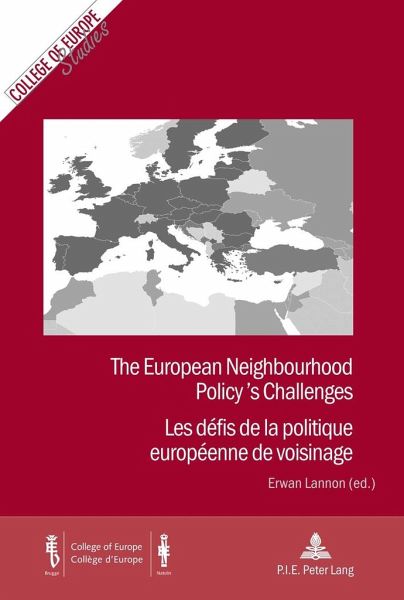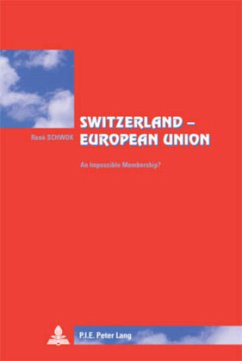
The European Neighbourhood Policy's Challenges / Les défis de la politique européenne de voisinage
Versandkostenfrei!
Versandfertig in 6-10 Tagen
63,35 €
inkl. MwSt.

PAYBACK Punkte
0 °P sammeln!
The aim of this book is to highlight the crucial challenges the EU and its partners are facing within the framework of the European Neighbourhood Policy (ENP). The approach followed is of an interdisciplinary nature. Lawyers, economists, political scientists and experts of geopolitical and geostrategic issues have contributed to this book that is sub-divided into three parts, namely: 'transversal challenges', 'challenges in the Mediterranean and the Middle-East', and 'challenges in Europe and Eurasia'. The book focuses on the main challenges emanating from the debate that emerged during the pr...
The aim of this book is to highlight the crucial challenges the EU and its partners are facing within the framework of the European Neighbourhood Policy (ENP). The approach followed is of an interdisciplinary nature. Lawyers, economists, political scientists and experts of geopolitical and geostrategic issues have contributed to this book that is sub-divided into three parts, namely: 'transversal challenges', 'challenges in the Mediterranean and the Middle-East', and 'challenges in Europe and Eurasia'. The book focuses on the main challenges emanating from the debate that emerged during the process of the 2011 revision of the ENP, including the potential consequences of the uprisings in the Mediterranean countries. The main challenges for the EU will be to support democratic transitions, to contribute to the resolution of protracted conflicts in the area and to progressively define the model of economic co-development and integration of the Pan-Euro-Mediterranean Area.
L'objectif de cet ouvrage est de mettre en lumière les défis cruciaux auxquels l'UE et ses partenaires doivent faire face dans le cadre de la Politique européenne de voisinage (PEV). L'approche suivie est de nature interdisciplinaire. Des juristes, des économistes, des politistes et des experts en géopolitique et géostratégie ont contribué à cet ouvrage qui se subdivise en trois parties : " les défis transversaux ", " les défis en Méditerranée et au Moyen-Orient " et les " défis en Europe et en Eurasie ". L'ouvrage se focalise sur les principaux défis qui ont emergé lors du processus de révision de la PEV en 2011, y compris les conséquences potentielles des révoltes dans les pays méditerranéens. Les principaux défis pour l'UE seront de soutenir les transitions démocratiques, de contribuer à la résolution des conflits de longue durée dans la région et de définir progressivement un modèle de co-développement économique et d'intégration de la zone pan-euro-méditerranéenne.
L'objectif de cet ouvrage est de mettre en lumière les défis cruciaux auxquels l'UE et ses partenaires doivent faire face dans le cadre de la Politique européenne de voisinage (PEV). L'approche suivie est de nature interdisciplinaire. Des juristes, des économistes, des politistes et des experts en géopolitique et géostratégie ont contribué à cet ouvrage qui se subdivise en trois parties : " les défis transversaux ", " les défis en Méditerranée et au Moyen-Orient " et les " défis en Europe et en Eurasie ". L'ouvrage se focalise sur les principaux défis qui ont emergé lors du processus de révision de la PEV en 2011, y compris les conséquences potentielles des révoltes dans les pays méditerranéens. Les principaux défis pour l'UE seront de soutenir les transitions démocratiques, de contribuer à la résolution des conflits de longue durée dans la région et de définir progressivement un modèle de co-développement économique et d'intégration de la zone pan-euro-méditerranéenne.












